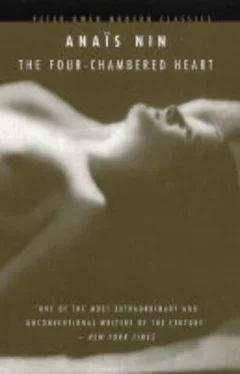Anaïs Nin - The Four-Chambered Heart
Здесь есть возможность читать онлайн «Anaïs Nin - The Four-Chambered Heart» весь текст электронной книги совершенно бесплатно (целиком полную версию без сокращений). В некоторых случаях можно слушать аудио, скачать через торрент в формате fb2 и присутствует краткое содержание. Год выпуска: 2004, ISBN: 2004, Издательство: Peter Owen Limited, Жанр: Классическая проза, Эротические любовные романы, на английском языке. Описание произведения, (предисловие) а так же отзывы посетителей доступны на портале библиотеки ЛибКат.
- Название:The Four-Chambered Heart
- Автор:
- Издательство:Peter Owen Limited
- Жанр:
- Год:2004
- ISBN:9780720611557
- Рейтинг книги:3 / 5. Голосов: 1
-
Избранное:Добавить в избранное
- Отзывы:
-
Ваша оценка:
- 60
- 1
- 2
- 3
- 4
- 5
The Four-Chambered Heart: краткое содержание, описание и аннотация
Предлагаем к чтению аннотацию, описание, краткое содержание или предисловие (зависит от того, что написал сам автор книги «The Four-Chambered Heart»). Если вы не нашли необходимую информацию о книге — напишите в комментариях, мы постараемся отыскать её.
The Four-Chambered Heart — читать онлайн бесплатно полную книгу (весь текст) целиком
Ниже представлен текст книги, разбитый по страницам. Система сохранения места последней прочитанной страницы, позволяет с удобством читать онлайн бесплатно книгу «The Four-Chambered Heart», без необходимости каждый раз заново искать на чём Вы остановились. Поставьте закладку, и сможете в любой момент перейти на страницу, на которой закончили чтение.
Интервал:
Закладка:
Rango found a place for Zora and himself at the top of a hill within a forest. Djuna took a room in a hotel farther down the hill and nearer to the harbor.
When Rango came down the hill on his bicycle and met Djuna at one of the cafes on the port, the sun was setting.
The night and the sea were velvety and caressing, unfolding a core of softness. As the plants exhaled a more mysterious flowering, people, too, shed their brighter day selves and donned colors and perfumes more appropriate to secret blooms. They dilated with the leaves, the shadows, at the approach of night.
The automobiles which passed carried all the flags of pleasure unfurled in audacious smiles, insolent scarves.
All the voices were pitched to a tone of intimacy. Sea, earth, and bodies seeking alliances, wearing their plumage of adventure, coral and turquoise, indigo and orange. Human corollas opening in the night, inviting pursuit, seeking capture, in all the dilations which allow the sap to rise and flow.
Then Rango said: “I must leave. Zora is afraid of the dark.”
To make it easier for Rango she bicycled back with him but when she returned alone to her room all the exhalations of the sea tempted her out again, and she returned to the port and sat at the same table where she had sat with Rango and watched the gaiety of the port as she had watched that first party out of her window as a girl, feeling again that all pleasure was unattainable for her.
People were dancing in the square to an accordion played by the village postmaster. The letter carrier invited her to dance, but all the time she felt Rango’s jealous and reproachful eyes on her. Every porthole, every light, seemed to be watching her dance with reproach.
So at ten o’clock she left the port and its festivities and bicycled back to her small hotel room.
As she climbed the last turn in the hill, pushing her bicycle before her, she saw a flashlight darting over her window which gave on the ground floor. She could not see who was wielding it, but she felt it was Rango and she called out to him joyously, thinking that perhaps Zora had fallen asleep and he was free and had come to be with her.
But Rango responded angrily to her greeting: “Where have you been?”
h, Rango, you’re too unjust. I couldn’t stay in my room at eight o’clock. It’s only ten now, and I’m back early, and alone. How can you be angry?”
But he was.
“You’re too unjust,” she said, and passing by him, almost running, she went into her room and locked the door.
The few times that she had held out against him, such as the time he had arrived at midnight instead of for dinner as he had promised, she had noticed that Rango’s anger abated, and that his knock on the door had not been imperious, but gentle and timid.
That is what happened now. And his timidity disarmed her anger.
She opened the door. And Rango stayed with her and they sought closeness again, as if to resolder all that his violence broke.
“You’re like Heathcliff, Rango, and one day everything will break.”
He had an incurable jealousy of her friends, because to him friends were the accomplices in the life she led outside of his precincts. They were the possible rivals, the witnesses, and perhaps the instigators to unfaithfulness. They were the ones secretly conniving to separate them.
But graver still was his jealousy of the friends who reflected an aspect of Djuna not included in her relationship to Rango, or which revealed aspects of Djuna not encompassed in the love, an unknown Djuna which she could not give to Rango. And this was a playful, a light, a peace-loving Djuna, the one who delighted in harmony, not in violence, the one who found outside of passion luminous moods and regions unknown to Rango. Or still the Djuna who believed understanding could be reached by effort, by an examination of one’s behavior, and that destiny could be reshaped, one’s twisted course redirected with lucidity.
She attracted those who knew how to escape the realm of sorrow by fantasy. Other extensions of Paul appeared, and one in particular of whom Rango was as jealous as if he had been a reincarnation of Paul. Though he knew it was an innocent friendship, still he stormed around it . He knew the boy could give Djuna a climate which his violence and intensity destroyed.
It was her old quest for a paradise again, a region outside of sorrow.
Lying on the sand with Paul the second (while Rango and Zora slept through half of the day) they built nine-pins out of driftwood, they dug labyrinths into the sand, they swam underwater looking for sea plants, and drugged themselves with tales.
Their only expression of a bond was his reaching for her little finger with his, as Paul had once done, and this was like an echo of her relation to Paul, a fragile bond, a bond like a game, but life-giving through its very airiness and delicacy.
Iridescent, ephemeral hours of relief from darkness.
When Rango came, blurred, soiled by his stagnant life with Zora, from quarrels, she felt stronger to meet this undertow of bitterness.
She wore a dress of brilliant colors, indigo and saffron; she brushed her hair until it glistened, and proclaimed in all her gestures a joyousness which she hoped would infect Rango.
But as often happened, this very joyousness alarmed him; he suspected the cause of it, and he set about to reclaim her from a region she had not traversed with him, the region of peace, faith, and gentleness he could never give her.
True that Paul the second had only appropriated her little finger and laid no other claim on her, true that Rango’s weight upon her body was like the earth, stronger and warmer, true that when his arms fell at her side with discouragement they were so heavy that she could not have lifted them, true that those made only of earth and fire were never illuminated, never lifted or borne above it, never free of it, but hopelessly entangled in its veins.
Her dream of freeing Rango disintegrated day by day. When she gave them the sun and the sea, they slept. Zora had ripped her bathing suit and was sewing it again. She would sew it for years.
It was clear to Djuna now that the four-chambered heart was no act of betrayal, but that there were regions necessary to life to which Rango had no access. It was not that Djuna wanted to house the image of Paul in one chamber and Rango in another, nor that to love Rango she must destroy the chamber inhabited by Paul—it was that in Djuna there was a hunger for a haven which Rango was utterly incapable of giving to her, or attaining with her.
If she sought in Paul’s brother a moment of relief, a moment of forgetfulness, she also sought in the dark, at night, someone without flaw, who would protect her and forgive all things.
Whoever was without flaw, whoever understood, whoever contained an inexhaustible flow of love was god the father whom she had lost in her childhood.
Alone at night, after the torments of her life with Rango, after her revolts against this torment which she had vainly tried to master with understanding of Rango, defeated by Rango’s own love of this inferno, because he said it was real, it was life, it was heightened life, and that happiness was a mediocre ideal, held in contempt by the poets, the romantics, the artists—alone at night when she acknowledged to herself that Rango was doomed and would never be whole again, that he was corrupted in his love of pain, in his belief that war and troubles heightened the flavor of life, that scenes were necessary to the climax of desire, like fire, suddenly in touching the bottom of the abysmal loneliness in which both relationships left her, she felt the presence of god again, as she had felt him as a child, or still at another time when she had been close to death.
Читать дальшеИнтервал:
Закладка:
Похожие книги на «The Four-Chambered Heart»
Представляем Вашему вниманию похожие книги на «The Four-Chambered Heart» списком для выбора. Мы отобрали схожую по названию и смыслу литературу в надежде предоставить читателям больше вариантов отыскать новые, интересные, ещё непрочитанные произведения.
Обсуждение, отзывы о книге «The Four-Chambered Heart» и просто собственные мнения читателей. Оставьте ваши комментарии, напишите, что Вы думаете о произведении, его смысле или главных героях. Укажите что конкретно понравилось, а что нет, и почему Вы так считаете.












